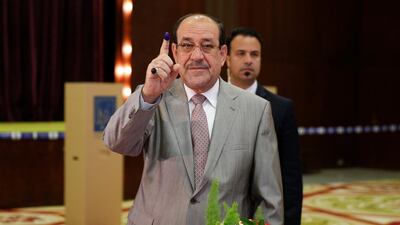There is no place for former Prime Minister Nouri Al Maliki in the coalition to form Iraq's next government, a spokesman for the recent election's largest political bloc has said.
"Nouri Al Maliki is not welcome to join the coalition," Dhiaa Al Assadi, a close aide to Shiite Cleric Moqtada Al Sadr, told The National.
Last month's parliamentary elections saw electoral lists led by nationalist Mr Al Sadr and Iranian-backed militia chief Hadi Al Amiri win the largest number of seats. The two leaders announced their intention to form an alliance of their political blocs on Wednesday.
They called on other political groups to join them in a coalition. Notably absent from that invitation was Mr Al Maliki.
It appears a decisive set back for Mr Al Maliki, who in the past managed to cling to power despite rising unpopularity.
Mr Al Maliki took power in 2006 with the blessing of both the United States and Iran. But he rapidly alienated the country's Sunni and Kurdish minorities by shutting them out of key security positions and undermining power-sharing agreements.
During the 2010 elections, a secular bloc headed by vice president Ayad Allawi won the most seats in parliament. But Tehran backed Mr Al Maliki to remain in power, who was able to form a "national unity" government with the help of Mr Al Sadr.
Mr Al Maliki was finally forced to step down in 2014 following the collapse of a third of Iraq's military and police units in the face of an ISIS offensive which overran a third of the country. He immediately assumed the largely ceremonial role for vice president. He was replaced as premier by fellow Dawa Party member Haider Al Abadi.
As general secretary of the Dawa party, Mr Maliki has retained political influence, though his State of Law coalition performed bellow expectations in the recent elections, winning just 26 seats.
The blocs controlled by Mr Al Sadr and Mr Amiri control 101 seats, short of the 165 required to form a majority.
Mr Al Sadr's Sairoun alliance, which also includes the Communist Party and secular candidates, won 54 seats, while Mr Amiri's Fatah coalition of Shiite paramilitaries won 47 seats.
Incumbent Prime Minister Abadi's Victory alliance took 42 seats.
"His Eminence [Mr Al Sadr] has always welcomed Dr Al Abadi to join his coalition," Mr Al Assadi said.
The Shiite cleric has previously vowed that he would not allow Mr Maliki another term as prime minister.
Even his former backers in Tehran may have given up on him. "Nouri Al Maliki was Iran's best person but they accept that he's not part of the next government because of the instability caused" during his time in power, Renad Mansour, senior research fellow at London's Chatham House, told The National.
“Al Sadr’s stance has been to side-line Nouri Al Maliki," he added.
Mr Al Sadr's strong election performance marked the culmination of years of speaking out against corruption and government mismanagement.
He first built his name outside of mainstream politics, as the head of the Mehdi Army militia which fought against the US occupation using sophisticated bombs likely supplied by the Iranians. But he has remained a staunch nationalist, critical of Iranian interference in Iraq.
For his proposed coalition to succeed, Mr Al Sadr will need to overcome grievances from members of his own bloc who insist Tehran should not be permitted to interfere in Iraq's affairs.
Iran backs Mr Al Amiri, a militia leader who spent two decades fighting former dictator Saddam Hussein from Iran. He is also close to General Qassem Soleimani, commander of foreign operations for Iran's Revolutionary Guards who has great influence in Iraq.


